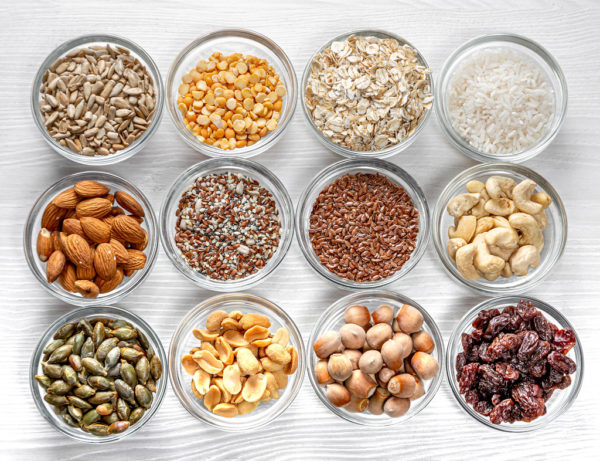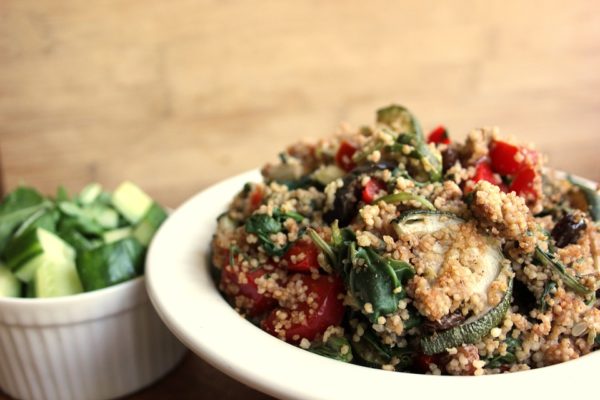If you’re trying to lose weight, there’s no way you’ll be successful without a weight loss diet. Both the caloric content and the nutritional quality of your diet make a difference.
Instead of trying to reinvent the wheel by cobbling together your own diet, the best way to get a head start on your weight loss goals is with a pre-planned diet for weight loss. But what’s the best weight loss diet?
There is no shortage of controversy over the right and wrong foods to include in a weight loss diet, or the right distribution of fat, carbs, and protein. Fortunately, though, there’s also no shortage of new scientific discoveries from health and nutrition researchers.
Our research team dove into the latest science on diets for weight loss to uncover the best and most effective nutritional strategies to lose weight and improve your health.
Research
Rankings
1. Noom Diet

Noom uses a psychologically-based algorithm to recommend specific components for a diet that you’re more likely to stick to, and pairs these results with the latest nutrition science.
The result is a highly personalized diet plan that comes paired with an app that gives you regular updates and encouragements. Noom gives you a color-coded key for dietary choices, ranging from green (low in calories and high in nutrients) to yellow to red (energy dense and poor nutritional quality).
Noom is one of the weight loss diets that has been studied scientifically, with three-quarters of users reporting success losing weight with the app. Thanks to its high degree of personalization, the Noom Diet is our top pick.
2. Mediterranean Diet

The Mediterranean Diet was borne out of epidemiological research studying the relationships between dietary patterns and long-term health around the world.
Its name derives from some of these initial findings, which indicated that people in Mediterranean countries who adhered to their traditional dietary patterns that were high in olive oil, vegetables, fish, nuts, legumes, and whole grains.
The Mediterranean Diet has transcended from “fad diet” to a major pillar of nutritional health thanks to large-scale studies that have confirmed its effectiveness at improving long-term health. If your focus is heart health and longevity, the Mediterranean Diet is an excellent choice.
3. DASH Diet

DASH stands for “Dietary Approaches to Stop Hypertension,” and got its start in clinical trials designed to lower blood pressure. The DASH Diet emphasizes low sodium, low sugar, and low red meat intake.
Like the Mediterranean diet, it encourages eating more fruits, vegetables, and whole grains, although it is higher in carbohydrates and puts some restrictions on nut and seed intake to keep overall fat intake low.
The DASH Diet has strong evidence supporting its ability to lower blood pressure, though it may not be as effective at lowering body weight without additional tweaks to keep caloric intake low.
4. Mayo Clinic Diet

The Mayo Clinic Diet, developed specifically for weight loss, bases its diet around fruits, vegetables, and plenty of daily physical activity. Unlike older diet plans, it puts more restrictions on carbohydrates, though it does keep fat and protein intake relatively low as well.
The Mayo Clinic Diet is composed of two phases, a more aggressive two-week plan to get you started, and a long-term plan to gradually decrease your weight even more.
5. Flexitarian Diet

A flexitarian diet is constructed almost the same as a vegetarian diet, with the exception of being flexible enough to allow occasional meat consumption. It still features many of the same features, such as being based around vegetables, legumes, and other non-animal sources of protein.
Flexitarian diets are increasingly popular, both among the public and among nutrition researchers, who believe that the ease of following a flexitarian diet makes it more feasible for a broader section of the population, who may struggle with a strict vegetarian or vegan diet.
6. Nordic Diet

Building off the successful template of geographically-based diets established by the Mediterranean Diet, the Nordic Diet was developed by a cooperative group among Scandinavian countries to counter growing rates of obesity in Nordic countries as well as unsustainable agricultural practices.
It encourages less red meat, more salmon and fatty fish, and more “wild” foods, like seeds, berries, rye, and oats. Now technically known as the “New Nordic Diet” after an update in 2012, it’s a strong choice for losing weight and decreasing your risk factors for heart disease at the same time.
7. WW Diet (Weight Watchers)

WW, formerly known as Weight Watchers, has a hybrid program that combines dietary guidance with regular community support, either with in-person meetings, virtual coaching sessions, or over an app.
The WW Diet is based on a points system, and the app delivers easy recipes with the points per meal listed. The point system makes it easy to limit your intake of energy-dense, low nutrient foods, which leads to fast and effective weight loss.
8. Volumetric Diet

The Volumetric Diet is based on a principle of avoiding foods that are energy-dense and nutrient-poor. Like many other high-quality diets, it converges on many of the same foods: fruits, vegetables, and legumes.
It more heavily penalizes oils, nuts, meat, and cheese, because of its focus on energy density. It’s a newer and less-studied diet, but if you are looking for an easy to follow diet that does not outright prohibit any kind of food, it’s a good diet to choose.
9. Jenny Craig Diet

While the Jenny Craig Diet has been around for a long time, it has amassed a respectable amount of scientific evidence supporting its efficacy. A review study in 2015, for example, listed it as one of the most effective commercially available weight loss programs (1). Like WW, Jenny Craig pairs dietary recommendations with coaching sessions, which may help account for its success.
10. Ornish Diet

The Ornish Diet combines the plant-based approach of a vegetarian diet with heavy restrictions on fat content. While some research has found that it is equally effective when compared to other commercial diet plans, it does face some criticism for its high carbohydrate content. Nevertheless, if you are willing to forgo meat entirely, it may be worth a try.
Who should start a weight loss diet?
While much of the science on nutrition and weight loss is rapidly changing, the facts regarding the prevalence of obesity and its health effects are as stubborn as ever.
Over 60% of Americans are overweight, and one in three adults are obese. On top of that, among the remaining adults who are at a normal weight, up to 20% of these adults are “metabolically unhealthy”—the biomarkers in their blood show all of the metabolic signs of being overweight or obese, and they are three times more likely to get heart disease compared to their normal weight peers who are not metabolically unhealthy (2).
While physical activity habits surely have something to do with these high rates of being obese, overweight, or normal weight but metabolically unhealthy, diet undoubtedly plays a huge role in losing weight as well as improving your metabolic health.
The prevalence of carrying around excess body fat increases over time, according to the Centers for Disease Control and Prevention’s National Center for Health Statistics (3). Being obese or overweight is most common among middle-aged adults, which makes them prime candidates for starting a weight loss diet.
However, there’s a strong argument that young adults can benefit as much or more from a weight loss diet: establishing healthy eating patterns and a healthy weight earlier on in life is enormously helpful for your long-term health.
As discussed above, don’t think you’re off the hook for having to watch your diet just because the number on the scale puts you at a normal weight for your sex and height. An increasing amount of research is focused on people who have a normal weight but are metabolically unhealthy.
Quite often, these people have low levels of subcutaneous fat (the kind right underneath your skin), but high levels of fat inside their organs (which is where fat does the most damage). Researchers have even coined an acronym for it—TOFI, which stands for “thin outside, fat inside” (4).
On an MRI scan, the inside of their liver can look just as bad as someone who is obese. Even if you are only a few pounds above your ideal weight, a shift in your dietary patterns can make a big difference when it comes to your long-term health.
Likely the biggest beneficiaries of a weight loss diet are people who already have health problems associated with or exacerbated by being overweight. This encompases a wide range of conditions, from high blood pressure and type two diabetes to osteoarthritis, depression, and low back pain (5), which goes to show the range of detrimental health effects obesity can have.
Contrary to what you might believe, you don’t need to drop massive amounts of weight to see significant health benefits. Even losing less than 10% of your body weight can lower your cholesterol, decrease your blood pressure, improve blood sugar control, and even extend your lifespan.
For people with pre-existing health problems tied to excess weight, getting on a weight loss diet and sticking to it is one of the best decisions you can make for your health.
How we ranked
Our research team based our rankings on the latest nutritional research. First, we sought out general research on the common components shared across different diets for weight loss that have been effective in clinical trials.
Many different types of diets are viable strategies for losing weight, but often seemingly disparate strategies have elements in common, like counting calories, portion control, increases in certain types of foods or nutrients (e.g. more nuts, unsaturated fats, fruits, vegetables, and fiber), and decreases in other foods or nutrients (e.g. less sugar, processed carbohydrates, or salt).
Once we had a working list of elements of success, we started evaluating weight loss diets based on whether or not they incorporated any of these proven elements of success. We also scoured the scientific literature for direct research studies, either on the diet itself or on components of the diet.
Some diets, like the Mediterranean diet, have been directly tested in several different large-scale clinical trials. Others, like the Noom Diet or the Volumetric Diet, haven’t been directly studied, but do have a number of components (like calorie counting and increasing dietary fiber intake, for example) that have been demonstrated to be effective in multiple studies.
We also evaluated weight loss diets on how easy they were to follow. While the effectiveness of a weight loss diet was still king when it came to our rankings, all else equal, an easy-to-follow diet will tend to lead to more weight loss than one that is extremely difficult to follow.
Extreme or heavily restricted diets fell out of the rankings here, because many of the same benefits they offered were garnered with more ease in a different diet that did end up in our list.
At this stage, we eliminated any diets that did not incorporate one of the common criteria for success, or did not include at least some components that were supported by scientific research.
That left out some of the trendier modern upstarts, like the keto diet and the paleo diet. Part of the reason these didn’t have much in the way of scientific support was because they are so new, but another part of it is that they get beat out by other diets that offer the same or more benefits and efficacy, while being easier to follow.
Flexitarian dieting, for example, which is plant-based but does not have the same heavy-handed restrictions as a vegan or raw food diet, can achieve practically equal benefits while being far easier to adhere to.
Finally, we calculated overall scores for each diet and ranked them accordingly to make our final list. The most important components were efficacy and evidence-based components of the diet, with flexibility and ease of following the diet being secondary factors that also contributed to the final score, albeit not as strongly. Our final list represents the best diets you should consider if you are looking to lose weight.
Benefits
Losing even a small amount of weight can significantly decrease your risk for cardiovascular disease. One reason why weight loss diets can seem intimidating to start is that you may feel like you are a long ways from a healthy weight.
Even if this is the case, there is strong scientific research demonstrating that drastic amounts of weight loss are not needed to significantly improve your health. One study, published in 2011 in the journal Diabetes Care, studied the effects of weight loss on risk factors for cardiovascular disease among adults who were overweight or obese, and who had type two diabetes (6).
The study involved a healthy eating and physical activity intervention, with a weight loss diet modeled on portion control, caloric restriction (aiming for 1200-1500 calories a day), and using meal replacement shakes or other meal replacement snacks to reduce overall caloric intake.
After analyzing initial results after one year, researchers found that even those who lost modest amounts of weight (5-10% of body weight over the first year of the study) experienced significant reductions in a wide range of risk factors for heart disease.These included lower blood sugar, blood pressure, triglycerides, and HbA1c, a form of hemoglobin strongly linked to heart disease.
While the improvements were not as strong as the improvements seen in participants that lost more than 10% of their body weight, the moderate weight loss group was nevertheless far better off than the participants whose weight had not changed.
A weight loss diet can improve symptoms of depression. Losing weight isn’t just tied to improvements in physical health. Mental health is also strongly linked to your metabolic state, and a weight loss diet is a powerful tool to shift the balance of your metabolism in a healthier direction.
According to a meta-analysis of weight loss interventions published in 2011 in the International Journal of Obesity, weight loss intervention programs are consistently associated with improvements in symptoms of depression (7).
Interestingly, these improvements seemed to have less to do with the amount of weight lost, and more to do with being on a weight loss diet and/or exercise program.
Evidence for this comes from the fact that pharmacological treatments did not have a significant effect on depression symptoms, even though they resulted in weight loss.
These findings suggest that being in a state of weight loss, rather than losing some set amount of weight, could be beneficial for mental health and could lead to improvements in the symptoms of depression.
Other research has found that poor physical and mental quality of life are correlated with each other in people with obesity, providing further evidence for the link between a healthy metabolic state and good physical and mental health (8).
The highest-quality studies to date have found that balanced low-calorie diets perform about as well as low-carbohydrate diets when it comes to weight loss. One of the most controversial issues in modern nutrition is the role of dietary macronutrients in determining the effectiveness of a weight loss diet.
Broadly, opinions can be divided into two camps: the ‘calories in, calories out’ camp, and the ‘carbohydrate-insulin hypothesis’ camp. Those who believe that calories in and calories out hold the key to weight loss hypothesize that all diets with the same caloric content should have equal benefits for weight loss.
On the other hand, those who hew to the carbohydrate-insulin hypothesis believe that dietary carbohydrate content has an outsized impact on metabolic function, and that high-carb diets encourage an out-of-control insulin response from your body that leads to excessive body fat accumulation.
Both camps have top experts that make these arguments, so there’s no clear winner just yet. However, the best research so far seems to suggest that caloric content seems to be the dominant factor.
A systematic analysis of published scientific reviews (a so-called “meta-meta-analysis”) on dietary composition and weight loss found that the highest-quality reviews, and the largest and best-controlled studies, tended to find similar amounts of weight loss between low carbohydrate diets and diets that focused mostly on low caloric intake and did not emphasize carbohydrate content (9).
Even this study, though, cautioned that more high-quality research is needed. As of right now, counting calories and portion control seems to be the most important factor as opposed to macronutrient content, but that could change as new research comes in.
Side effects
The side effects of a weight loss diet are well-known and fairly mild: lower caloric intake can leave you feeling tired, out of energy, and, of course, hungry. One of the reasons why natural weight loss supplements often include derivatives of coffee or green tea is precisely because the caffeine they contain counteracts all of these adverse effects, while also boosting your body’s fat oxidation rate.
As such, coffee, green tea, green coffee bean extract, or green tea extract are all potential ways to counteract the side effects of going on a diet for weight loss (although each of these in turn have their own side effect profiles to worry about).
Rarer side effects of a weight loss diet can also include gastrointestinal disturbances like diarrhea, an elevated risk of gallstones, and loss of muscle mass (10).
In some cases, gastrointestinal issues can be traced to introduction of foods your body isn’t accustomed to yet (high fiber foods being a prime example); for these cases, symptoms generally improve over time.
A probiotic supplement or digestive enzymes can also help treat gastrointestinal side effects of being on a diet for weight loss.
Despite the potential for these side effects, the benefits of a weight loss diet vastly outweigh the potential for adverse effects. The health benefits of even modest amounts of weight loss are so strong and so far-reaching that there is no reason to hold off on a weight loss diet because of the potential for negative side effects.
Often these side effects can be ameliorated by tweaking your diet without abandoning it entirely, or by adding a specific supplement.
FAQ
Q: What kind of weight loss diet should men follow?
A: Men who are on a weight loss diet may have more success following a diet plan that involves small but frequent meals. According to research published in the British Journal of Nutrition, men’s relatively higher fat-free mass (i.e. muscle mass) allows them to benefit more from frequent small meals (11).
Men can also leverage the advantages garnered by higher levels of testosterone. Since men can increase their muscle mass to a greater degree through strength training, and since greater muscle mass leads to greater resting energy expenditure, men should strongly consider pairing their weight loss diet with a strength training program, as well as strategies to boost testosterone levels.
Q: What kind of weight loss diet should women follow?
A: Women can follow a broader range of dieting strategies with success compared to men, but have to put increased emphasis on tracking caloric intake.
That’s because the other major tool for weight loss, which is physical activity, appears to be less effective for women looking to lose weight, at least according to a scientific review article published in 2009 in the journal Obesity Reviews (12).
The reasons for this may have to do with men’s higher levels of anabolic hormones, which allow them to burn more fat and add muscle mass with greater ease.
The good news from these data is that women can put more of their time and effort into their diet, without focusing as much on planning out a workout regimen. Of course, physical activity does still help women lose weight—just not as much as it helps men lose weight.
Q: Are all weight loss diets the same?
A: Many weight loss diets have similar components, like calorie counting, avoiding sugar and processed carbohydrates, and increasing your intake of water and dietary fiber.
However, not all diets are the same. Often, different diets (both of which have led some users to success) will have directly contradictory advice, which is part of what leads to the controversy surrounding weight loss diets.
The low fat diets popularized in the ‘80s and ‘90s, for example, ran up against the Mediterranean diet, which prominently endorses sources of healthy fats like fish, olive oil, nuts, and seeds.
Modern-day controversy continues with diets like the DASH diet, which endorses whole grains, which runs contrary to many of the more aggressive low-carb dieting approaches for weight loss.
These points of differentiation are important to keep in mind, as the scientific research on best nutritional practices is always evolving—the low fat diets of past decades, for example, have not held up against modern diets featuring healthy fats.
Q: How much weight can you lose in seven days?
A: In only a week, you’re unlikely to lose more than a few pounds of actual fat. While dramatic weight loss in a week is certainly possible, much of the weight you’ll be losing is water weight as opposed to body fat.
Athletes and bodybuilders, for example, can drop 20 pounds or more in a week before a competition. If you analyzed their body composition, though, you’d find that their actual body fat content changes very little in this timeframe.
More realistic weight loss tends to happen over the course of weeks and months—and this is the kind of weight loss that actually leads to health benefits.
While it can be encouraging to see the number on the scale drop quickly, your real goal should be sustained, long-term changes in your body composition, which require more than a few days to see results.
Q: What kind of diet is best for losing belly fat?
A: Losing fat in any one area specifically is difficult if not impossible. To drop belly fat, you have to decrease your overall body fat content, and the best way to do that is with a diet that sustains long-term caloric deficits and encourages fat oxidation.
The Noom Diet, Mediterranean Diet, or Mayo Clinic Diet, all paired with regular physical activity, are all great candidates. Keep in mind that the distribution of fat in your body is influenced by genetics and by hormones.
Women, for example, are less prone to accumulating belly fat than men.Regardless, if your body fat content is consistently going down, you will be dropping belly fat along the way.
Q: What foods are weight loss friendly?
A: If you are looking for the most general categories of foods that are weight loss friendly, aim for foods that are high in fiber, relatively low in their calorie count, and have more in the way of protein versus sugars and refined carbohydrates.
These recommendations include most types of foods you’d generally regard as healthy: vegetables, nuts, seeds, beans and legumes, and fish, chicken, and turkey.
The rationale for these recommendations is based on nutritional science and biochemistry: foods with a lot of fiber, like beans and leafy green vegetables, are very effective at making you feel full, but are not particularly calorie-dense.
Fiber has additional benefits too, including functioning as a carb blocker and boosting your levels of probiotic bacteria.
Opting for protein-rich foods versus those heavy in refined carbohydrates leverages the fat-burning and satiety-inducing benefits of protein.
One of the reasons protein supplements are often used for weight loss is because protein induces a feeling of fullness, or satiety, as well as increasing your body’s metabolic rate.
Q: What diets are best to lose weight quickly?
A: To lose weight quickly, you need a large caloric deficit—that’s purely a consequence of calories in and calories out. In terms of practical diets, those that still leave you feeling fairly full, like the volumetric diet, will be easier if you are specifically aiming for a very low calorie diet.
Contrary to previously-held popular wisdom, losing large amounts of weight in a short period of time is not associated with worse long-term weight maintenance (13).
If you want to lose a large amount of weight in a relatively short period of time (e.g. a few months), a very low calorie diet (1200 Calories per day, or even less in some cases), followed by a shift to a long-term maintenance diet is the best strategy.
Any diet that encourages calorie counting or portion control, like the Noom diet, is a good candidate for adaptation for rapid weight loss.
Q: Is the keto diet a good way to lose weight?
A: The ketogenic diet can be an effective, albeit drastic, way to lose weight: scientific research has found that very low carbohydrate ketogenic diets tend to achieve greater amounts of weight loss compared to classic low-fat diets (14).
However, these findings are in the context of well-controlled studies, which may not translate into the real world. The keto diet is notoriously difficult to stick with, which is why it didn’t make our rankings of the top weight loss diets.
Q: Does your diet need to be low in carbs to lose weight?
A: Carbohydrate content is one of the most controversial aspects of modern weight loss diets, with experts on both sides forcefully arguing their case.
Even in top medical journals, there is as of yet no broad agreement on whether low carbohydrate diets are superior to balanced low-calorie diets, either for weight loss or for long-term health.
As of right now, the latest meta-analysis studies have not found substantial differences between weight lost in large, high-quality studies of low carb versus balanced low calorie diets (15).
These results suggest that you do not need to be on a low carbohydrate diet to lose weight (indeed, some diets like the Olmish diet are explicitly high in carbohydrates), but many people, and many individual studies, do find them successful.
Related articles
- Natural weight loss supplement
- Weight loss programs
- Weight loss apps
- Weight loss pills
- Carb blocker
- Meal replacement shake
- Blood sugar
- Snacks for weight loss
Recap
Losing weight doesn’t have to be difficult if you are on the right weight loss diet. With an evidence-based approach that delivers appropriate amounts of macronutrients, foods that contribute to weight loss, and behaviors like calorie counting, choosing a good diet can help you not just lose weight, but improve your health as well.
Even small to moderate amounts of weight loss can lead to substantial benefits, both in terms of your health and your quality of life. With a weight loss diet, it’s all about consistency: choosing a high quality diet plan and sticking with it for the long run is the best possible way to lose weight and keep it off.
Establishing your diet as an integral part of your routine and your lifestyle is your best bet, both for long-term weight loss and long-term health.
For BodyNutrition‘s #1 weight loss diet recommendation, click here.